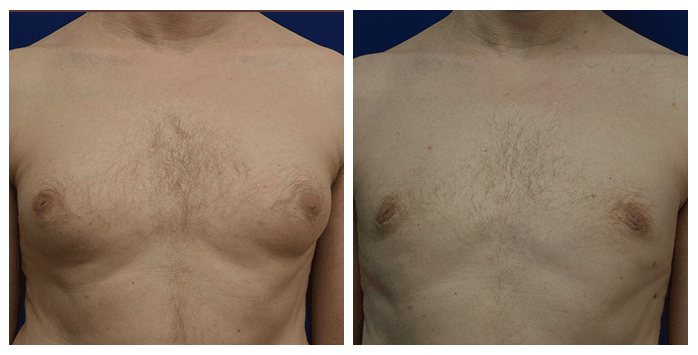Gynecomastia (Male Breast Reduction)in Portland, Oregon
Quick Links ‹
- What Is Gynecomastia Surgery?
- Gynecomastia Benefits
- Types of Gynecomastia
- Gynecomastia Causes
- Who Is a Good Candidate?
- Details of the Procedure
- Preparing For Male Breast Reduction
- The Male Breast Reduction Procedure
- Recovering from Male Breast Reduction
- Results and Recovery
- Schedule a Consultation
- Gynecomastia FAQs
What Is Gynecomastia Surgery?
Some men may develop enlarged breasts, which is known as gynecomastia. This condition can occur at any age and possibly be due to obesity, heredity, or hormonal changes. It is often characterized by an excess of localized fat or glandular tissue, sometimes present in one or both breasts.
This condition may be uncomfortable and unwanted by those who have it. In this case, the solution may be gynecomastia surgery, which is the removal of this enlargement. The procedure is designed to remove the excess fat and tissue to create a flatter, more defined chest.
Gynecomastia Benefits
Patients experience many benefits when having gynecomastia surgery or male breast reduction. They can look forward to a smoother, flatter, and more masculine chest, increased confidence, reduced discomfort with their body, improved posture, and even more clothing options. And because all incisions are strategically placed, scarring is very minimal.
Types of Gynecomastia
There are three common forms of gynecomastia: puffy nipples, pseudo-gynecomastia, and idiopathic gynecomastia.
Puffy Nipples
Puffy nipples is the most common type of gynecomastia and involve extra breast tissue beneath the nipples, leading them to look puffy or protruding. While this is not severe and likely won’t affect your health, it can negatively affect your confidence.
Pseudo-Gynecomastia
Pseudogynecomastia is often mistaken for gynecomastia but is caused by the build-up of fat instead of glandular breast tissue. It’s often caused by weight gain and can be addressed by making changes to your lifestyle or with liposuction.
Idiopathic Gynecomastia
Idiopathic gynecomastia is the enlargement of the breasts without a known cause. This type is usually harmless but can cause physical discomfort and a decrease in confidence and self-esteem.
Gynecomastia Causes
There are a number of different causes for gynecomastia, including the following:
- Hormonal changes
- Certain medications like antidepressants, antibiotics, chemotherapy drugs, and prostate cancer medications
- Alcohol
- Marijuana
- Amphetamines
- Genetics
- Liver diseases
- Kidney disease
- Thyroid disorders
Who Is a Good Candidate?
Men who experience symptoms of gynecomastia and want to have it removed are ideal candidates for this procedure. Those who are healthy, at a stable weight, and whose breast development has stabilized will be a good fit for gynecomastia surgery. Dr. Fichadia will help you to determine if you qualify for this procedure and which methods will need to be used during the surgery.
Details of the Procedure
During gynecomastia surgery, it may be necessary to use liposuction, surgical excision, or a combination of both. The extent of your surgery will depend on what needs to be removed in order to successfully be completed. Liposuction is used to remove the excess fat, while those with extra glandular tissue will need a surgical excision performed to have it safely removed.
Preparing For Male Breast Reduction
There are a few changes to your lifestyle you’ll want to make before having gynecomastia surgery or male breast reduction. You’ll want to stick to a healthy lifestyle, including diet and exercise, and maintain a stable weight. You’ll also want to lower your alcohol consumption, avoid blood thinners, and avoid smoking tobacco products.
You will also want to arrange to have a friend or family member drive you to and from surgery. They will also need to look after you for a couple of days after surgery.
Before surgery, plan your recovery space as well. Pick a spot in your home where you can rest and relax. Set up extra blankets and pillows, entertainment materials, and anything else you’ll need for your recovery. This may include filling any prescriptions you need.
The night prior to surgery, you will also need to avoid eating and drinking to avoid anesthesia complications. You’ll also want to come to surgery showered and clean. Wear comfortable clothes that will be easy to take off and put on after surgery.
The Male Breast Reduction Procedure
To start your male breast reduction procedure, we’ll administer general anesthesia to ensure you’re completely comfortable.
During gynecomastia surgery, it may be necessary to use liposuction, surgical excision, or a combination of both. The extent of your surgery will depend on what needs to be removed in order to successfully be completed. Liposuction is used to remove the excess fat, while those with extra glandular tissue will need a surgical excision performed to have it safely removed.
Once everything has been removed and Dr. Fichadia closes your incisions, you’ll be ready to start your recovery process.
Recovering from Male Breast Reduction
The time it takes to recover after a gynecomastia surgery will depend on how extensive the surgery needs to be. For those who only require liposuction, it will take about a week or less to return to daily activities. If your surgery requires a surgical excision to remove breast tissue, then it may take around two weeks or more to resume your daily routine.
You will want to rest as much as possible, wear your compression garment, and follow all of Dr. Fichadia’s post-op instructions.
Results and Recovery
The time it takes to recover after a gynecomastia surgery will depend on how extensive the surgery needs to be. For those who only require liposuction, it will take about a week or less to return to daily activities. If your surgery requires a surgical excision to remove breast tissue, then it may take around two weeks or more to resume your daily routine.
The results of gynecomastia surgery will be noticeable immediately following the procedure. However, the final effects won’t be noticeable until after the swelling subsides. You will be fitted with a compression garment to help manage the swelling as you recover. At around three months the results of your surgery should be stabilized. In order to keep the effects of the surgery permanent, it’s important to maintain stable body weight.
Schedule a Consultation
If you’re interested in gynecomastia surgery and want to learn more, schedule a consultation with Dr. Fichadia today. To make an appointment, call our Portland office at 503-488-2344 or fill out an online form.
Gynecomastia FAQs
Can gynecomastia be cured without surgery?
For some patients, gynecomastia may go away without surgery. This depends on the cause of the gynecomastia. For example, patients who have gynecomastia during puberty often see the condition subside as their hormone levels stabilize over time.
Does gynecomastia go away with weight loss?
For some patients, gynecomastia does go away with weight loss. For others, enlarged breasts are due to excess glandular tissue that does not subside with weight loss, meaning that surgery is required.
How long does it take to recover from male breast reduction?
On average, recovery from male breast reduction surgery takes 1-2 weeks. After this time, patients can return to everyday routines including work or school, but should still avoid strenuous activity.
What is the best treatment for gynecomastia?
The most effective treatment option for gynecomastia is surgery. For some patients, hormone replacement therapy or weight loss may also help reduce the appearance of gynecomastia.
What causes gynecomastia in males?
Gynecomastia may be caused by several factors. Typically, hormone imbalance, side effects from drugs, or weight gain cause gynecomastia.
Dr. Fichadia is a double board-certified, comprehensively trained plastic and reconstructive surgeon. She completed general surgical training at St Elizabeth’s Medical Center, an affiliate of Tufts University School of Medicine in Boston, MA, and subsequently completed a highly competitive plastic surgery program at Oregon Health and Science University in Portland, OR. She has presented research from her time in Boston and Portland at national and international surgical meetings such as Clinical Congress of the American College of Surgeons and annual meeting of American Society of Plastic Surgery.
- Dr. Hetal Fichadiahttps://www.drfichadia.com/author/admin/
- Dr. Hetal Fichadiahttps://www.drfichadia.com/author/admin/
- Dr. Hetal Fichadiahttps://www.drfichadia.com/author/admin/
- Dr. Hetal Fichadiahttps://www.drfichadia.com/author/admin/
 (503) 488-2344
(503) 488-2344







